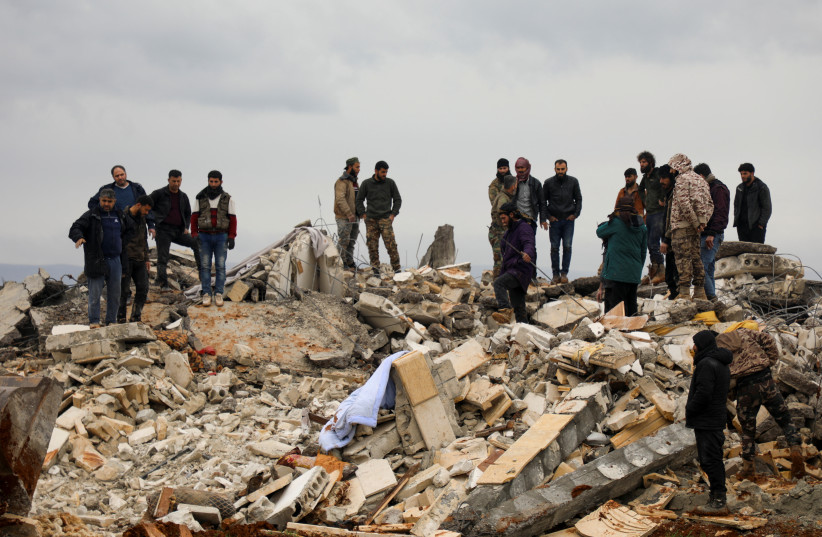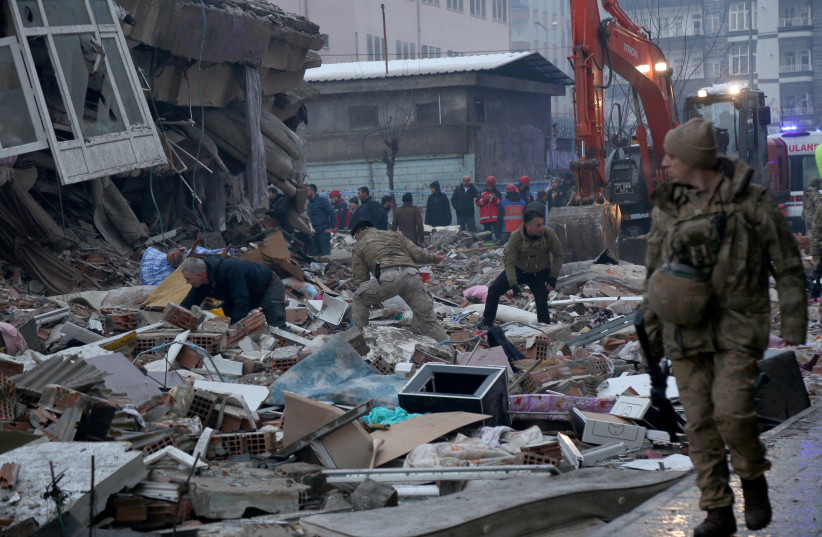The massive earthquakes on Monday will hold ramifications for the rest of the Middle East. Some will result in aid flowing to the affected regions, while others may hold important consequences for relations between countries in the region.
Israel-Turkey ties
Israel has rushed to support Turkey. Statements have come from the Knesset and Prime Minister Benjamin Netanyahu, while Defense Minister Yoav Gallant spoke to his Turkish counterpart. The Foreign and Defense ministries have both painted a picture of a government acting in unity to help its neighbor and ally.
Israel has decades of experience in providing aid following natural disasters, including many earthquakes, as well as providing search-and-rescue teams and humanitarian assistance, especially under the guidance of the Home Front Command.
Israel-Turkey ties improved significantly in the past year, including through high-level visits and better diplomatic ties. This relationship will now prove fruitful, as Israel will likely be heavily involved in supporting relief efforts. This will be important for showing the Turkish people how much Israel cares, by helping displaced people and broadcasting to the region a positive picture of ties, as well as the coexistence of the kind envisioned by the Abraham Accords.
What may come out of this are even stronger ties. However, there will likely be challenges ahead.

Syrian divisions may hamper aid
The destruction in Syria is immense. The affected areas are already home to millions of people displaced by more than 10 years of civil war, people who often live in camps or in simple dwellings.
Videos show entire areas destroyed, areas that already lack infrastructure and hospitals as well as access to humanitarian relief. For instance, the United Nations has already restricted aid deliveries. Key border crossings, such as Bab al-Hawa, are a lifeline for millions. Given the destruction in Hatay, it is unclear if Ankara can help the Syrians across the border.
Who will help the people in Afrin where militias, such as the extremist Tahrir al-Sham, a Sunni Islamist group, and Turkish-backed Syrian National Army are competing over the area? Will the White Helmets and other groups that played a role during the conflict in Syria be able to help civilians? What about Turkey’s Disaster and Emergency Management Authority, the Turkish Cooperation and Coordination Agency, Turkish NGO Humanitarian Relief Foundation (IHH) and humanitarian groups? Will they step up?
IHH, for instance, had a warehouse in Kilis that prepared food for Syrians. Will the Syrian regime and its Russian backers be able to provide assistance in Aleppo, where a building collapse in January killed 16? The Syrian regime is isolated and currently under sanctions.
Iran, which backs the Syrian regime, is already dealing with its own earthquake in its northwest. How can Iran, which is also under sanctions, help? Will anyone be able to coordinate efforts in Syria? Considering the divided landscape, the fighting and the fact many countries have spent more time bombing Syria than helping rebuild it, will Syrians actually get anything? Is it possible a famine or worse may break out due to this disaster?
Is it possible that sanctions on Syria will be reduced to enable more aid passage? The earthquakes could prove to be a turning point for Syria and its ability to mend ties with Turkey and normalize relations. Could this give Turkey’s rulers the excuse to finally meet the Bashar Assad regime face to face, and could this change the conflict lines that have divided the country?
Can the US, Russia and others put tensions on the back burner?
Russia’s Foreign Minister Sergei Lavrov visited Iraq as Moscow looks to bring together Turkey, Iran, Syria and Russia to meet for normalization talks. Meanwhile, the United States is angry with Iran over drone exports to Russia to aid its invasion of Ukraine.
Will the earthquakes and the massive toll they have taken lead to these countries putting aside their grievances to help civilians? The US plays a key role in eastern Syria. The US-backed SDF operates in key cities that are not far from the affected areas. Might the US and the anti-ISIS coalition finally decide that it holds more than just a military role and provide some humanitarian support?
It is possible that Turkey and the militias it backs in Syria will stop attacking civilians and be willing to set aside the endless war for a month and let humanitarian convoys go through Manbij, Kobani or other areas.
Turkey had for a while been threatening to invade these areas and has often bombed the people living there. Now that the earthquakes have harmed so many, is it possible that Ankara will stop the fighting and cooperate to save lives? Can the US step up and set an example with the Russians in Syria, to provide aid rather than create controversy?
Kurdish leaders in the region have all expressed sympathy for the victims of the earthquakes. Perhaps, in the aftermath, the conflicts that have divided the region can be momentarily reduced, and Kurds, Turks and others will be able to work in solidarity.
Turkey’s elections in the spotlight
Turks are set to go to the polls in May, but the massive toll of the earthquakes will likely take months to deal with. Is it plausible the election will be postponed? Or will Turkey’s ruling AKP Party exploit the aftermath in an effort to sideline opponents?
In the past, the AKP used elections as an excuse to start conflicts or claim to “fight terrorism” and arrest political opponents. It’s unclear if it will seek to manipulate the aftermath of the earthquakes in order to get support, or direct support to mayors who are affiliated with the party.
On the other hand, if Ankara is viewed by the public as mishandling the earthquake response, would this hurt the ruling party at the ballot box? Another issue is that Ankara has spent heavily on other issues, such as defense. Will the earthquakes reveal where the leadership has not been focusing, such as on building codes and preparation? These will be key questions to watch for.

Lessons learned for regional preparedness
Israel and other countries in the region face major threats from earthquakes. The devastation in Turkey should be a lesson to every country to see what can be learned.
Considering that Turkey has a long history with earthquakes, there will be questions about building construction, whether codes were followed or if the guidelines were correct and whether emergency services were prepared.
Huge earthquakes like these cannot be prevented, but countries like Israel will need to see what they can take away from it. Syria is ravaged, while northern Iraq and Iran could be affected as well, as will Armenia and Azerbaijan. This means the region will want to help Turkey as it prepares for the next one.
Countries in the region can take advantage of this to work together. Israel and its Abraham Accords partners, via the Negev Forum, could set aside time to discuss how to better prepare to work jointly on future natural disasters.
Countries that don’t have relations with Israel could also consider setting aside their negative views for a time and look at how joint humanitarian assistance could work to improve conditions in the region.
